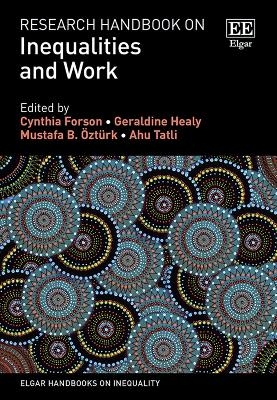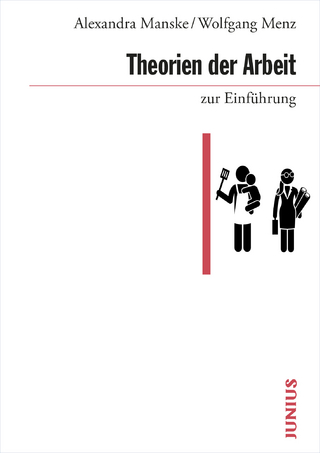
Research Handbook on Inequalities and Work
Edward Elgar Publishing Ltd (Verlag)
978-1-80088-659-9 (ISBN)
This Research Handbook sees an impressive array of experts from the Global North and South explore inequality at work from many differing conceptual and methodological perspectives and in multiple national contexts. The chapters showcase cutting-edge research on a highly diverse range of global working environments. The authors consider the interrelated and intersectional influences of identity, social class, sex, gender, race, ethnicity, disability and belief in relation to cultures, organisations, occupations, resistance and regulation and provide unique insights into the complex nature of inequalities in workplaces, informed by contexts and power relations.
This Research Handbook will be essential reading for students, academics and researchers interested in organizational behaviour, employment relations, labour policy, human resource management, public policy and sociology. Far-reaching in its scope, it will also prove invaluable for professionals and policymakers looking to improve working conditions across a range of critical areas.
Edited by Cynthia Forson, Lancaster University, Geraldine Healy, Mustafa B. Öztürk and Ahu Tatli, School of Business and Management, Queen Mary University of London, UK
Contents:
1 Introduction – the pervasive nature of inequalities 1
Geraldine Healy, Ahu Tatli, Cynthia Forson and Mustafa B. Öztürk
PART I APPROACHES TO INEQUALITY RESEARCH AND PRACTICE
2 Diversity ideologies and practices in Sub-Saharan Africa 22
Nasima M. H. Carrim, Eileen Kwesiga, Yetunde Anibaba and Stella M. Nkomo
3 The propagation of workplace inequalities through sexual- and
gender-identity normativities: understanding heteronormativity,
homonormativity, cisnormativity, and transnormativity in organisations 39
Mustafa B. Öztürk
4 Migrant workers and precarity in neoliberal times 51
Barbara Samaluk
5 White feminism in organisation studies: a calling out 64
Elaine Swan
6 Autoethnography as a research approach – bringing the self into
research on workplace inequalities 73
Saoirse Caitlin O’Shea
PART II REGULATION AND VOLUNTARISM IN WORKPLACE
INEQUALITIES
7 Inequalities in the labour market and workplaces in China: the role of the state 88
Fang Lee Cooke and Qijie Xiao
8 The Federal Character Principle and the politics of ethnic representation
in Nigeria’s public sector 102
Ifedapo Adeleye, Nkiru Nwokoroku and Olawale Ajai
9 State regulation and quotas – international perspectives on the use of
gender quotas for corporate boards 113
Cathrine Seierstad and Hilde Fjellvær
10 Religion or belief legal cases in the workplace 125
David Perfect
11 The pay ‘transparency agenda’: toward regulation or voluntarism to
expose gender pay gaps in the UK and the US 140
Emily Pfefer
12 Women’s representation and the gender pay gap: rank, institutional
research intensity and ethnicity in UK business schools 156
Geraldine Healy, Emily Pfefer and Almudena Sevilla
13 Using public procurement to promote equality in employment:
assessment of the evidence from Australia, South Africa and the UK 179
Tessa Wright, Hazel Conley and E.K. Sarter
14 The European Union, the member states and equality – an uneasy relationship? 195
Marco Peruzzi
PART III CULTURE, ORGANISATIONS AND INEQUALITY
15 Inequalities and the media: spread and reception of hate speech against
migrants and refugees in social media 210
David Blanco-Herrero, Javier J. Amores and Carlos Arcila-Calderón
16 Transforming leadership emergence through equality, diversity and inclusion 227
Dilek Torunoğlu Tinay, Özlem Ayaz and Mustafa Özbilgin
17 Women’s long-term social movement participation – an American case 241
Geraldine Healy and Gill Kirton
18 Leadership, Africa and the South African context 256
Anita Maharaj
19 Cracks in diversity: pink money, depoliticization, and conservatism in Brazil 271
Luiz Alex Silva Saraiva and Camilla Quental
20 Disability and work inequalities 285
Katherine J. C. Sang, María de los Angeles Zapata Rodriguez and Jennifer
Remnant
21 Black women and inequality in the workplace 298
Victoria Showunmi
22 The political case for diversity: managing difference in Jewish diaspora
organisations 318
Edith Pick
23 Financial wellbeing and ethnicity 334
Chidozie Umeh and Nelarine Cornelius
PART IV CONTEXT, OCCUPATIONS, CAREERS AND
INEQUALITIES AT WORK
24 Winners and losers of digitalisation of work 354
Mark Bergfeld
25 The original gig economy: gendered precarious working in the UK
music industry 369
Vick Bain
26 Medical careers in the NHS: a case of segregation and disadvantage 384
Carol Woodhams, Carol Atkinson and Ira Parnerkar
27 An intersectional study of women’s practice of entrepreneurship in Sri Lanka 404
Manesha Peiris
28 Safe and suitable yet unequal for women: understanding the inequalities
in the hiring process in the Indian software industry 419
Shreyashi Chakraborty
PART V CRISIS, COVID, INEQUALITIES AND CHANGE
29 Future of working at home 435
Abigail Marks, Oliver Mallett, Lila Skountridaki and Danny Zschomler
30 Racism, COVID-19 and the racial patterning of society – the perfect
storm to highlight racial inequalities 455
Nicolas Treloar
31 Entering a frightening Kafkaesque world during the Covid-19 pandemic
lockdown: fears and changes for disabled people 468
Nadia Ahmed
32 Client-facing work and homeworking: the case of auditors 479
Suki Sian
33 What about the formal workers? Informality in formal employment and
social protection gaps in developing countries during the COVID-19 pandemic 491
Volkan Yilmaz
PART VI CLIMATE CHANGE AND INEQUALITIES
34 Climate change, inequality and work in the construction industry 506
Linda Clarke, Melahat Sahin-Dikmen and Edmundo Werna
35 Green is not White: giving voice to Indigenous, Black and racially
marginalized workers in the environmental justice movement 522
Naolo Charles, Patricia Chong, Tyjana Connolly, Denise Hampden, Anna
Liu, Rosemarie Powell, Shanice Regis-Wilkins and Christopher Wilson
36 Climate crisis and labour market inequalities: a socio-ecological fix
approach to energy transition in Greece 539
Vasiliki Krommyda, Stelios Gialis and Anastasia Stratigea
| Erscheinungsdatum | 14.03.2024 |
|---|---|
| Reihe/Serie | Elgar Handbooks on Inequality |
| Verlagsort | Cheltenham |
| Sprache | englisch |
| Maße | 169 x 244 mm |
| Themenwelt | Sozialwissenschaften ► Soziologie ► Mikrosoziologie |
| Wirtschaft | |
| ISBN-10 | 1-80088-659-4 / 1800886594 |
| ISBN-13 | 978-1-80088-659-9 / 9781800886599 |
| Zustand | Neuware |
| Haben Sie eine Frage zum Produkt? |
aus dem Bereich


